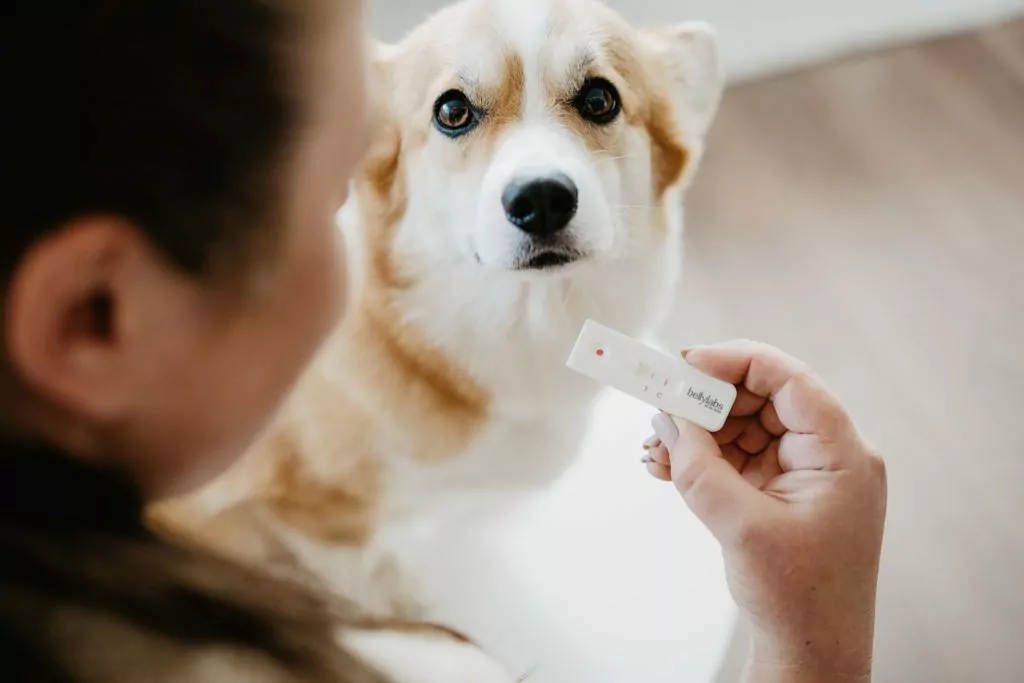Did You Know You Can Test Canine Pregnancy Via a Blood Test?
Humans can test for pregnancy from a simple at-home urine test; a dog pregnancy test is a little more complicated. Pregnancy in dogs differs quite a lot compared to humans. For starters, their pregnancy only lasts nine weeks, compared to a human’s nine months!

To test if a dog is pregnant, blood can be used to measure the hormone “relaxin,” which is produced by the placenta in pregnant dogs. Relaxin can be measured once the embryo has been implanted about three weeks after mating.
Performing a blood test is just one way to know your dog is pregnant; read on to find out more.
Pregnancy vs. Pseudopregnancy in Dogs
Pseudopregnancy is a condition in some entire female dogs where there are physical and behavioral changes that mimic pregnancy following a heat cycle. Pseudo- means imitation, and that’s exactly what a pseudopregnancy is an imitation or false pregnancy.
Pseudopregnancy can occur in some female dogs 45-60 days after a heat. It is caused by a decrease in progesterone hormone, causing an increase in prolactin which can cause changes that look like pregnancy.
These changes include mammary development, nesting behaviors, and sometimes aggression. Pseudopregnancy is not a real pregnancy, and dogs that show signs of pseudopregnancy will have a negative relaxin hormone test.
Pseudopregnancy is usually self-limiting, but you should seek medical advice to rule out pregnancy and if the pseudopregnancy does not seem to go away.
Is My Dog Pregnant? (Signs and Symptoms)
There are some signs that your dog could be pregnant. These include:
- Mammary development: as a dog’s pregnancy progresses, you may notice mammary development as the tissue develops and grows. Later in pregnancy, milk may be able to be expressed, and you may see the nipples become darker in color.
- Feeding changes: early in pregnancy, some dog’s appetites reduce. This usually corrects itself after a few weeks when a pregnant dog develops an increased appetite to help manage the increased calories required for fetal development. However, in late pregnancy, the appetite may reduce.
- Change in body shape: as the pregnancy continues and the fetuses grow, you may notice your dog become rounder in the abdomen. This is a combination of fetus development and extra fat stores to help the dog feed the puppies when they are born.
- Behavioral changes: a pregnant dog will often show signs of nesting, especially when they are close to delivery. This usually involves finding a room or closet and placing objects such as bedding or soft toys to make a comfortable space to deliver her pups. Other behavior changes can include aggression, becoming more affectionate and sleeping more, or becoming less active.
These signs are not always reliable indicators of pregnancy, so it is recommended to have your dog checked by a veterinarian to see if they are pregnant and, if they aren’t, why they are displaying these signs.
The Pros and Cons of The Relaxin Test
Pros
- It may be more affordable than other ways to confirm pregnancy.
- Good reliability of results, i.e., a positive result means it is likely a dog is pregnant.
- It can be done at home (only if someone is available who is trained in collecting blood from dogs).
- Results can be shown very quickly.
Cons
- Requires blood to be taken.
- Can show false negatives, i.e., a negative result doesn’t always mean a dog isn’t pregnant. Make sure to test at least 22 days after breeding. If the test is negative, then repeat one week later, rarely you may need to do it a third time.
- It can be expensive if you need to repeat the test.
- It does not confirm the puppies are viable. The test only establishes the presence of a placenta. To confirm live puppies, an ultrasound is needed to see heartbeats.
Alternative Methods to Confirm Dog Pregnancy
There are other methods to confirm pregnancy. Your veterinarian can perform these.
- Physical Exam is the traditional way of detecting pregnancy in dogs. Through the careful palpation of the abdomen, a veterinarian may be able to detect swellings in the uterus that indicate the presence of developing puppies.
This technique is only possible in calm, relaxed dogs that aren’t overweight. It is also dependent on the stage of pregnancy and is best performed from 25-35 days pregnant. Palpation can not confirm that the puppies are alive.

- X-rays of the abdomen of pregnant dogs can reveal puppies if they are present. However, X-rays are only possible once a skeleton has developed, as this is what an x-ray picks up on. For this reason, x-rays can only be reliably used in the last three weeks of gestation. X-rays are useful for counting numbers of puppies, but they can not confirm viability.
- Ultrasound is the most reliable way of detecting and monitoring pregnancy in dogs. An ultrasound of the abdomen of pregnant dogs can show developing fetuses from as early as three weeks post-breeding.
Ultrasound is the “gold standard” for pregnancy testing and can be used to confirm the viability of the puppies through visualizing their hearts’ beating. Ultrasound can also be helpful to track development and determine the health of puppies by measuring heart rates.
How Do Dog Pregnancy Tests Work?
A dog home pregnancy test measures relaxin, a hormone produced by the placentas in dogs after the embryos implant.
When the blood is collected from a pregnant female dog, the relaxin hormone will cause a positive result. Therefore, a positive result from a pregnancy test in dogs shows the presence of the relaxin hormone in a dog’s blood.
The relaxin hormone is not produced in other parts of the body, so a positive result shows implantation of an embryo has occurred in the dog’s placenta. Conversely, a negative blood test means there are not adequate levels of Relaxin in the blood, but this does not mean a dog is not pregnant.
The Reliability of At-Home Dog Pregnancy Tests
A blood test is the only way to measure the relaxin hormone. Dog urine pregnancy tests are not reliable and are not recommended to test for pregnancy.
A positive pregnancy at-home pregnancy test where the blood is tested for relaxin should, in theory, be a reliable way to confirm pregnancy. However, it would be recommended to confirm this pregnancy by your veterinarian, ideally with ultrasound, to ensure the puppies are alive.
A negative at-home pregnancy test does not always mean a dog is not pregnant. A pregnancy test should be done at least 22 days after mating. If the result is negative, the test should be repeated a week later.
If the result continues to be negative, then a third test should be considered, but it would be recommended to seek veterinary advice at this stage.
Reasons a pregnant dog may show a negative test result include the test being performed too soon. This could occur if the breeding date is unclear. Also, in small and toy breed dogs with small numbers of fetuses, the amount of relaxin produced may not be enough to cause a positive test.
Therefore, it is recommended to consider alternative forms of pregnancy testing if you think your dog might be pregnant.
Where Can I Buy a Dog Pregnancy Test?
At-home dog pregnancy test kits can be bought online, but there are currently no tests that veterinarians back as these tests can be unreliable.
Instead, it is recommended to get your dog seen by a veterinarian who can perform more reliable tests such as ultrasound.
Can You Give a Dog a Human Pregnancy Test?
Human pregnancy tests detect the hormone human chorionic gonadotropin (hCG). This is a hormone only found in pregnant humans and will not be created in a pregnant dog. This means human pregnancy tests are not able to be used on dogs.
Pregnancy can be tricky to test in dogs, and it is only once they have been pregnant for at least three weeks before it can be confirmed. Although some at-home pregnancy tests are available on the market, they can be expensive, require blood collection, and aren’t always very reliable.
It would be recommended to have your dog checked by a veterinarian to have a check-up and ultrasound to confirm a viable pregnancy in your pooch.
